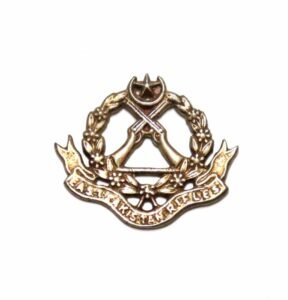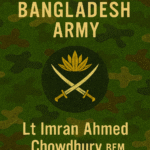The Pakistan Army unleashed Operation Searchlight on 25th March 1971 in Dhaka, a night of terror that massacred students, intellectuals, and ordinary citizens. The news travelled fast, and within hours, anger and resistance spread among Bengali members of the armed forces and paramilitary units.
But it was the East Pakistan Rifles—the border force of East Pakistan—that responded first and most decisively. On 26th March, various outposts began rebelling against their West Pakistani superiors. On 27th March, my father and his men at Shamshernagar lit the torch in Sylhet. Similar revolts echoed from Comilla to Dinajpur, Jessore to Rangpur, transforming E.P.R. camps into the first bastions of the Liberation War.
The E.P.R. was unique. Unlike the regular army, which was heavily dominated by West Pakistani officers, the rank and file of the E.P.R. were overwhelmingly Bengali—loyal to the soil, the villages, and the people they came from. Their revolt was not only natural but inevitable. They brought with them not just arms and training but also local knowledge of the terrain, which became invaluable in the guerrilla war that followed.
Bravery and Sacrifice
The story of E.P.R. in 1971 is written in blood and sacrifice. From the very onset, E.P.R. soldiers took upon themselves the dual responsibility of fighting a professional army and simultaneously raising, training, and leading civilian volunteers into the Mukti Bahini.
These men faced immense odds. Poorly armed compared to the Pakistan Army, they fought with sheer determination and intimate knowledge of borderlands, rivers, forests, and villages. The price was steep. Thousands of E.P.R. men laid down their lives in ambushes, counter-attacks, and direct battles. Many more were captured and executed. Yet they never faltered.
It is this silent resilience, away from the limelight of history, that demands recognition. When we celebrate the victory of 16th December, we must remember that it was paved with the bones and blood of men whose names never made it into textbooks.
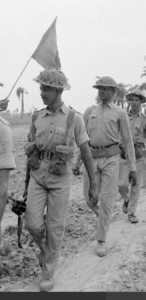
Junior Leadership and Sub-Sectors
Another critical dimension of the E.P.R.’s role was leadership at the junior level. With many commissioned Bengali officers either absent or sidelined in 1971, it was the Subedars, Naib Subedars, Havildars, and Lance Naiks who stepped forward to command. They organised platoons, defended positions, and inspired freedom fighters in villages.
Across the country, E.P.R. sub-sectors became the backbone of resistance. These were not abstract formations; they were real, on-the-ground leadership structures run by men who had perhaps never imagined they would command such large groups. And yet, they adapted. They set up freedom fighter camps, provided training in arms, and coordinated with the newly emerging Z-Force, K-Force, and S-Force—the sector troops raised under the command of regular army officers who had defected to join the Liberation War.
Without the groundwork laid by the E.P.R., the sector system could not have functioned so effectively.
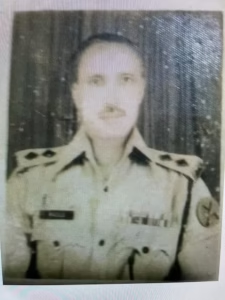
From 26th March to 16th December
The span of the war—nine grueling months—saw the E.P.R. fighting from the very first day to the last. While many groups joined the war later, the E.P.R. never had the luxury of time or preparation. They were there from the start, and they endured till the end.
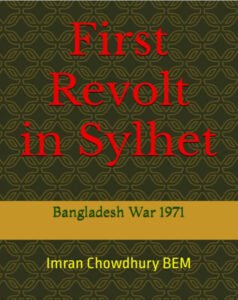
In April and May, E.P.R. camps were systematically attacked by the Pakistan Army. Many were overrun; others scattered into the countryside to regroup. Yet, even in defeat, they laid the foundation of guerrilla warfare. As the war dragged on, E.P.R. veterans became the natural trainers and commanders of village youth who poured in to join the Mukti Bahini.
By the time Indian support became formalised in late 1971, the Mukti Bahini already had a core of experienced fighters—thanks largely to the E.P.R. Their sacrifices kept the flame alive when the world doubted whether Bengalis could sustain a war against a professional army.
Why This Book?
Mainstream history has not always done justice to the E.P.R. Their contribution has often been overshadowed by the narratives of the regular army defectors or the final joint operations with India. Yet, history is not complete if we leave out those who first bled for the nation.
My book, “E.P.R. in Liberation War”, is my humble attempt to set this record straight. It will not only recount the battles and operations but also highlight the personal bravery, leadership, and human sacrifice of the men who came from ordinary villages and went on to become extraordinary heroes.
It will showcase how they commanded sub-sectors, freedom fighter camps, and worked shoulder-to-shoulder with the sector troops and the Z-Force, K-Force, and S-Force until the last day of the war. It will tell the story of how a paramilitary force, often underestimated, became the sharp edge of Bangladesh’s fight for independence.
A Son’s Tribute
For me, this book is more than research or writing. It is a tribute to my father and his comrades. It is a way of honouring the memory of men like him who revolted without hesitation, knowing full well the risks. It is also a message to future generations—that freedom was not gifted, it was earned, and it was earned by men whose names we must never forget.
The East Pakistan Rifles may have changed its name over the decades—becoming Bangladesh Rifles and later Border Guard Bangladesh—but its legacy is rooted in that fateful year of 1971. That legacy must be celebrated, taught, and remembered.
Looking Ahead
As I compile stories, testimonies, and historical accounts, I remain struck by one truth: without the East Pakistan Rifles, the Liberation War could not have begun the way it did. Their revolt transformed despair into hope, and hope into victory.
“E.P.R. in Liberation War” is therefore not just a book—it is a historical duty. It is the stitching together of a tapestry that has too long been left frayed. And above all, it is a reminder that the victory of 16th December 1971 was not inevitable; it was earned through the blood and sacrifice of men who chose to stand against tyranny when it was hardest to do so.
This book will, I hope, finally give the East Pakistan Rifles the place they deserve in the history of Bangladesh—a place at the forefront, as the vanguard of freedom.
✍️ By Lt. Imran Ahmed Chowdhury BEM
Author, Historian, and Son of a Freedom Fighter


